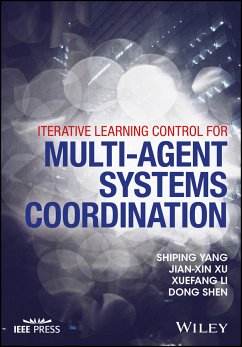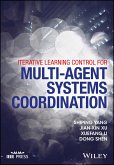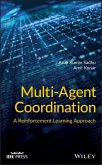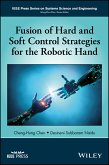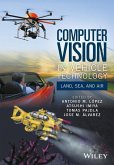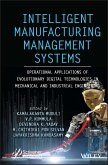Shiping Yang, Jian-Xin Xu, Xuefang Li, Dong Shen
Iterative Learning Control for Multi-agent Systems Coordination (eBook, ePUB)
111,99 €
111,99 €
inkl. MwSt.
Sofort per Download lieferbar

0 °P sammeln
111,99 €
Als Download kaufen

111,99 €
inkl. MwSt.
Sofort per Download lieferbar

0 °P sammeln
Jetzt verschenken
Alle Infos zum eBook verschenken
111,99 €
inkl. MwSt.
Sofort per Download lieferbar
Alle Infos zum eBook verschenken

0 °P sammeln
Shiping Yang, Jian-Xin Xu, Xuefang Li, Dong Shen
Iterative Learning Control for Multi-agent Systems Coordination (eBook, ePUB)
- Format: ePub
- Merkliste
- Auf die Merkliste
- Bewerten Bewerten
- Teilen
- Produkt teilen
- Produkterinnerung
- Produkterinnerung

Bitte loggen Sie sich zunächst in Ihr Kundenkonto ein oder registrieren Sie sich bei
bücher.de, um das eBook-Abo tolino select nutzen zu können.
Hier können Sie sich einloggen
Hier können Sie sich einloggen
Sie sind bereits eingeloggt. Klicken Sie auf 2. tolino select Abo, um fortzufahren.

Bitte loggen Sie sich zunächst in Ihr Kundenkonto ein oder registrieren Sie sich bei bücher.de, um das eBook-Abo tolino select nutzen zu können.
A timely guide using iterative learning control (ILC) as a solution for multi-agent systems (MAS) challenges, showcasing recent advances and industrially relevant applications
Explores the synergy between the important topics of iterative learning control (ILC) and multi-agent systems (MAS) | Concisely summarizes recent advances and significant applications in ILC methods for power grids, sensor networks and control processes | Covers basic theory, rigorous mathematics as well as engineering practice
- Geräte: eReader
- mit Kopierschutz
- eBook Hilfe
- Größe: 20.19MB
Andere Kunden interessierten sich auch für
![Iterative Learning Control for Multi-agent Systems Coordination (eBook, PDF) Iterative Learning Control for Multi-agent Systems Coordination (eBook, PDF)]() Shiping YangIterative Learning Control for Multi-agent Systems Coordination (eBook, PDF)111,99 €
Shiping YangIterative Learning Control for Multi-agent Systems Coordination (eBook, PDF)111,99 €![Multi-Agent Coordination (eBook, ePUB) Multi-Agent Coordination (eBook, ePUB)]() Arup Kumar SadhuMulti-Agent Coordination (eBook, ePUB)117,99 €
Arup Kumar SadhuMulti-Agent Coordination (eBook, ePUB)117,99 €![Fusion of Hard and Soft Control Strategies for the Robotic Hand (eBook, ePUB) Fusion of Hard and Soft Control Strategies for the Robotic Hand (eBook, ePUB)]() Cheng-Hung ChenFusion of Hard and Soft Control Strategies for the Robotic Hand (eBook, ePUB)118,99 €
Cheng-Hung ChenFusion of Hard and Soft Control Strategies for the Robotic Hand (eBook, ePUB)118,99 €![The Impact of Automatic Control Research on Industrial Innovation (eBook, ePUB) The Impact of Automatic Control Research on Industrial Innovation (eBook, ePUB)]() The Impact of Automatic Control Research on Industrial Innovation (eBook, ePUB)107,99 €
The Impact of Automatic Control Research on Industrial Innovation (eBook, ePUB)107,99 €![Cellular V2X for Connected Automated Driving (eBook, ePUB) Cellular V2X for Connected Automated Driving (eBook, ePUB)]() Cellular V2X for Connected Automated Driving (eBook, ePUB)106,99 €
Cellular V2X for Connected Automated Driving (eBook, ePUB)106,99 €![Computer Vision in Vehicle Technology (eBook, ePUB) Computer Vision in Vehicle Technology (eBook, ePUB)]() Computer Vision in Vehicle Technology (eBook, ePUB)81,99 €
Computer Vision in Vehicle Technology (eBook, ePUB)81,99 €![Intelligent Manufacturing Management Systems (eBook, ePUB) Intelligent Manufacturing Management Systems (eBook, ePUB)]() Intelligent Manufacturing Management Systems (eBook, ePUB)190,99 €
Intelligent Manufacturing Management Systems (eBook, ePUB)190,99 €-
-
-
A timely guide using iterative learning control (ILC) as a solution for multi-agent systems (MAS) challenges, showcasing recent advances and industrially relevant applications
Hinweis: Dieser Artikel kann nur an eine deutsche Lieferadresse ausgeliefert werden.
- Explores the synergy between the important topics of iterative learning control (ILC) and multi-agent systems (MAS)
- Concisely summarizes recent advances and significant applications in ILC methods for power grids, sensor networks and control processes
- Covers basic theory, rigorous mathematics as well as engineering practice
Dieser Download kann aus rechtlichen Gründen nur mit Rechnungsadresse in D ausgeliefert werden.
Hinweis: Dieser Artikel kann nur an eine deutsche Lieferadresse ausgeliefert werden.
Produktdetails
- Produktdetails
- Verlag: Wiley
- Erscheinungstermin: 8. März 2017
- Englisch
- ISBN-13: 9781119189077
- Artikelnr.: 52554451
- Verlag: Wiley
- Erscheinungstermin: 8. März 2017
- Englisch
- ISBN-13: 9781119189077
- Artikelnr.: 52554451
- Herstellerkennzeichnung Die Herstellerinformationen sind derzeit nicht verfügbar.
Shiping Yang, Jian-Xin Xu, and Xuefang Li
National University of Singapore
Dong Shen
Beijing University of Chemical Technology, P.R. China
National University of Singapore
Dong Shen
Beijing University of Chemical Technology, P.R. China
Preface ix
1 Introduction 1
1.1 Introduction to Iterative Learning Control 1
1.1.1 Contraction-Mapping Approach 3
1.1.2 Composite Energy Function Approach 4
1.2 Introduction to MAS Coordination 5
1.3 Motivation and Overview 7
1.4 Common Notations in This Book 9
2 Optimal Iterative Learning Control for Multi-agent Consensus Tracking 11
2.1 Introduction 11
2.2 Preliminaries and Problem Description 12
2.2.1 Preliminaries 12
2.2.2 Problem Description 13
2.3 Main Results 15
2.3.1 Controller Design for Homogeneous Agents 15
2.3.2 Controller Design for Heterogeneous Agents 20
2.4 Optimal Learning Gain Design 21
2.5 Illustrative Example 23
2.6 Conclusion 26
3 Iterative Learning Control for Multi-agent Coordination Under Iteration-Varying Graph 27
3.1 Introduction 27
3.2 Problem Description 28
3.3 Main Results 29
3.3.1 Fixed Strongly Connected Graph 29
3.3.2 Iteration-Varying Strongly Connected Graph 32
3.3.3 Uniformly Strongly Connected Graph 37
3.4 Illustrative Example 38
3.5 Conclusion 40
4 Iterative Learning Control for Multi-agent Coordination with Initial State Error 41
4.1 Introduction 41
4.2 Problem Description 42
4.3 Main Results 43
4.3.1 Distributed D-type Updating Rule 43
4.3.2 Distributed PD-type Updating Rule 48
4.4 Illustrative Examples 49
4.5 Conclusion 50
5 Multi-agent Consensus Tracking with Input Sharing by Iterative Learning Control 53
5.1 Introduction 53
5.2 Problem Formulation 54
5.3 Controller Design and Convergence Analysis 54
5.3.1 Controller Design Without Leader's Input Sharing 55
5.3.2 Optimal Design Without Leader's Input Sharing 58
5.3.3 Controller Design with Leader's Input Sharing 59
5.4 Extension to Iteration-Varying Graph 60
5.4.1 Iteration-Varying Graph with Spanning Trees 60
5.4.2 Iteration-Varying Strongly Connected Graph 60
5.4.3 Uniformly Strongly Connected Graph 62
5.5 Illustrative Examples 63
5.5.1 Example 1: Iteration-Invariant Communication Graph 63
5.5.2 Example 2: Iteration-Varying Communication Graph 64
5.5.3 Example 3: Uniformly Strongly Connected Graph 66
5.6 Conclusion 68
6 A HOIM-Based Iterative Learning Control Scheme for Multi-agent Formation 69
6.1 Introduction 69
6.2 Kinematic Model Formulation 70
6.3 HOIM-Based ILC for Multi-agent Formation 71
6.3.1 Control Law for Agent 1 72
6.3.2 Control Law for Agent 2 74
6.3.3 Control Law for Agent 3 75
6.3.4 Switching Between Two Structures 78
6.4 Illustrative Example 78
6.5 Conclusion 80
7 P-type Iterative Learning for Non-parameterized Systems with Uncertain Local Lipschitz Terms 81
7.1 Introduction 81
7.2 Motivation and Problem Description 82
7.2.1 Motivation 82
7.2.2 Problem Description 83
7.3 Convergence Properties with Lyapunov Stability Conditions 84
7.3.1 Preliminary Results 84
7.3.2 Lyapunov Stable Systems 86
7.3.3 Systems with Stable Local Lipschitz Terms but Unstable Global Lipschitz Factors 90
7.4 Convergence Properties in the Presence of Bounding Conditions 92
7.4.1 Systems with Bounded Drift Term 92
7.4.2 Systems with Bounded Control Input 94
7.5 Application of P-type Rule in MAS with Lo
1 Introduction 1
1.1 Introduction to Iterative Learning Control 1
1.1.1 Contraction-Mapping Approach 3
1.1.2 Composite Energy Function Approach 4
1.2 Introduction to MAS Coordination 5
1.3 Motivation and Overview 7
1.4 Common Notations in This Book 9
2 Optimal Iterative Learning Control for Multi-agent Consensus Tracking 11
2.1 Introduction 11
2.2 Preliminaries and Problem Description 12
2.2.1 Preliminaries 12
2.2.2 Problem Description 13
2.3 Main Results 15
2.3.1 Controller Design for Homogeneous Agents 15
2.3.2 Controller Design for Heterogeneous Agents 20
2.4 Optimal Learning Gain Design 21
2.5 Illustrative Example 23
2.6 Conclusion 26
3 Iterative Learning Control for Multi-agent Coordination Under Iteration-Varying Graph 27
3.1 Introduction 27
3.2 Problem Description 28
3.3 Main Results 29
3.3.1 Fixed Strongly Connected Graph 29
3.3.2 Iteration-Varying Strongly Connected Graph 32
3.3.3 Uniformly Strongly Connected Graph 37
3.4 Illustrative Example 38
3.5 Conclusion 40
4 Iterative Learning Control for Multi-agent Coordination with Initial State Error 41
4.1 Introduction 41
4.2 Problem Description 42
4.3 Main Results 43
4.3.1 Distributed D-type Updating Rule 43
4.3.2 Distributed PD-type Updating Rule 48
4.4 Illustrative Examples 49
4.5 Conclusion 50
5 Multi-agent Consensus Tracking with Input Sharing by Iterative Learning Control 53
5.1 Introduction 53
5.2 Problem Formulation 54
5.3 Controller Design and Convergence Analysis 54
5.3.1 Controller Design Without Leader's Input Sharing 55
5.3.2 Optimal Design Without Leader's Input Sharing 58
5.3.3 Controller Design with Leader's Input Sharing 59
5.4 Extension to Iteration-Varying Graph 60
5.4.1 Iteration-Varying Graph with Spanning Trees 60
5.4.2 Iteration-Varying Strongly Connected Graph 60
5.4.3 Uniformly Strongly Connected Graph 62
5.5 Illustrative Examples 63
5.5.1 Example 1: Iteration-Invariant Communication Graph 63
5.5.2 Example 2: Iteration-Varying Communication Graph 64
5.5.3 Example 3: Uniformly Strongly Connected Graph 66
5.6 Conclusion 68
6 A HOIM-Based Iterative Learning Control Scheme for Multi-agent Formation 69
6.1 Introduction 69
6.2 Kinematic Model Formulation 70
6.3 HOIM-Based ILC for Multi-agent Formation 71
6.3.1 Control Law for Agent 1 72
6.3.2 Control Law for Agent 2 74
6.3.3 Control Law for Agent 3 75
6.3.4 Switching Between Two Structures 78
6.4 Illustrative Example 78
6.5 Conclusion 80
7 P-type Iterative Learning for Non-parameterized Systems with Uncertain Local Lipschitz Terms 81
7.1 Introduction 81
7.2 Motivation and Problem Description 82
7.2.1 Motivation 82
7.2.2 Problem Description 83
7.3 Convergence Properties with Lyapunov Stability Conditions 84
7.3.1 Preliminary Results 84
7.3.2 Lyapunov Stable Systems 86
7.3.3 Systems with Stable Local Lipschitz Terms but Unstable Global Lipschitz Factors 90
7.4 Convergence Properties in the Presence of Bounding Conditions 92
7.4.1 Systems with Bounded Drift Term 92
7.4.2 Systems with Bounded Control Input 94
7.5 Application of P-type Rule in MAS with Lo
Preface ix
1 Introduction 1
1.1 Introduction to Iterative Learning Control 1
1.1.1 Contraction-Mapping Approach 3
1.1.2 Composite Energy Function Approach 4
1.2 Introduction to MAS Coordination 5
1.3 Motivation and Overview 7
1.4 Common Notations in This Book 9
2 Optimal Iterative Learning Control for Multi-agent Consensus Tracking 11
2.1 Introduction 11
2.2 Preliminaries and Problem Description 12
2.2.1 Preliminaries 12
2.2.2 Problem Description 13
2.3 Main Results 15
2.3.1 Controller Design for Homogeneous Agents 15
2.3.2 Controller Design for Heterogeneous Agents 20
2.4 Optimal Learning Gain Design 21
2.5 Illustrative Example 23
2.6 Conclusion 26
3 Iterative Learning Control for Multi-agent Coordination Under Iteration-Varying Graph 27
3.1 Introduction 27
3.2 Problem Description 28
3.3 Main Results 29
3.3.1 Fixed Strongly Connected Graph 29
3.3.2 Iteration-Varying Strongly Connected Graph 32
3.3.3 Uniformly Strongly Connected Graph 37
3.4 Illustrative Example 38
3.5 Conclusion 40
4 Iterative Learning Control for Multi-agent Coordination with Initial State Error 41
4.1 Introduction 41
4.2 Problem Description 42
4.3 Main Results 43
4.3.1 Distributed D-type Updating Rule 43
4.3.2 Distributed PD-type Updating Rule 48
4.4 Illustrative Examples 49
4.5 Conclusion 50
5 Multi-agent Consensus Tracking with Input Sharing by Iterative Learning Control 53
5.1 Introduction 53
5.2 Problem Formulation 54
5.3 Controller Design and Convergence Analysis 54
5.3.1 Controller Design Without Leader's Input Sharing 55
5.3.2 Optimal Design Without Leader's Input Sharing 58
5.3.3 Controller Design with Leader's Input Sharing 59
5.4 Extension to Iteration-Varying Graph 60
5.4.1 Iteration-Varying Graph with Spanning Trees 60
5.4.2 Iteration-Varying Strongly Connected Graph 60
5.4.3 Uniformly Strongly Connected Graph 62
5.5 Illustrative Examples 63
5.5.1 Example 1: Iteration-Invariant Communication Graph 63
5.5.2 Example 2: Iteration-Varying Communication Graph 64
5.5.3 Example 3: Uniformly Strongly Connected Graph 66
5.6 Conclusion 68
6 A HOIM-Based Iterative Learning Control Scheme for Multi-agent Formation 69
6.1 Introduction 69
6.2 Kinematic Model Formulation 70
6.3 HOIM-Based ILC for Multi-agent Formation 71
6.3.1 Control Law for Agent 1 72
6.3.2 Control Law for Agent 2 74
6.3.3 Control Law for Agent 3 75
6.3.4 Switching Between Two Structures 78
6.4 Illustrative Example 78
6.5 Conclusion 80
7 P-type Iterative Learning for Non-parameterized Systems with Uncertain Local Lipschitz Terms 81
7.1 Introduction 81
7.2 Motivation and Problem Description 82
7.2.1 Motivation 82
7.2.2 Problem Description 83
7.3 Convergence Properties with Lyapunov Stability Conditions 84
7.3.1 Preliminary Results 84
7.3.2 Lyapunov Stable Systems 86
7.3.3 Systems with Stable Local Lipschitz Terms but Unstable Global Lipschitz Factors 90
7.4 Convergence Properties in the Presence of Bounding Conditions 92
7.4.1 Systems with Bounded Drift Term 92
7.4.2 Systems with Bounded Control Input 94
7.5 Application of P-type Rule in MAS with Lo
1 Introduction 1
1.1 Introduction to Iterative Learning Control 1
1.1.1 Contraction-Mapping Approach 3
1.1.2 Composite Energy Function Approach 4
1.2 Introduction to MAS Coordination 5
1.3 Motivation and Overview 7
1.4 Common Notations in This Book 9
2 Optimal Iterative Learning Control for Multi-agent Consensus Tracking 11
2.1 Introduction 11
2.2 Preliminaries and Problem Description 12
2.2.1 Preliminaries 12
2.2.2 Problem Description 13
2.3 Main Results 15
2.3.1 Controller Design for Homogeneous Agents 15
2.3.2 Controller Design for Heterogeneous Agents 20
2.4 Optimal Learning Gain Design 21
2.5 Illustrative Example 23
2.6 Conclusion 26
3 Iterative Learning Control for Multi-agent Coordination Under Iteration-Varying Graph 27
3.1 Introduction 27
3.2 Problem Description 28
3.3 Main Results 29
3.3.1 Fixed Strongly Connected Graph 29
3.3.2 Iteration-Varying Strongly Connected Graph 32
3.3.3 Uniformly Strongly Connected Graph 37
3.4 Illustrative Example 38
3.5 Conclusion 40
4 Iterative Learning Control for Multi-agent Coordination with Initial State Error 41
4.1 Introduction 41
4.2 Problem Description 42
4.3 Main Results 43
4.3.1 Distributed D-type Updating Rule 43
4.3.2 Distributed PD-type Updating Rule 48
4.4 Illustrative Examples 49
4.5 Conclusion 50
5 Multi-agent Consensus Tracking with Input Sharing by Iterative Learning Control 53
5.1 Introduction 53
5.2 Problem Formulation 54
5.3 Controller Design and Convergence Analysis 54
5.3.1 Controller Design Without Leader's Input Sharing 55
5.3.2 Optimal Design Without Leader's Input Sharing 58
5.3.3 Controller Design with Leader's Input Sharing 59
5.4 Extension to Iteration-Varying Graph 60
5.4.1 Iteration-Varying Graph with Spanning Trees 60
5.4.2 Iteration-Varying Strongly Connected Graph 60
5.4.3 Uniformly Strongly Connected Graph 62
5.5 Illustrative Examples 63
5.5.1 Example 1: Iteration-Invariant Communication Graph 63
5.5.2 Example 2: Iteration-Varying Communication Graph 64
5.5.3 Example 3: Uniformly Strongly Connected Graph 66
5.6 Conclusion 68
6 A HOIM-Based Iterative Learning Control Scheme for Multi-agent Formation 69
6.1 Introduction 69
6.2 Kinematic Model Formulation 70
6.3 HOIM-Based ILC for Multi-agent Formation 71
6.3.1 Control Law for Agent 1 72
6.3.2 Control Law for Agent 2 74
6.3.3 Control Law for Agent 3 75
6.3.4 Switching Between Two Structures 78
6.4 Illustrative Example 78
6.5 Conclusion 80
7 P-type Iterative Learning for Non-parameterized Systems with Uncertain Local Lipschitz Terms 81
7.1 Introduction 81
7.2 Motivation and Problem Description 82
7.2.1 Motivation 82
7.2.2 Problem Description 83
7.3 Convergence Properties with Lyapunov Stability Conditions 84
7.3.1 Preliminary Results 84
7.3.2 Lyapunov Stable Systems 86
7.3.3 Systems with Stable Local Lipschitz Terms but Unstable Global Lipschitz Factors 90
7.4 Convergence Properties in the Presence of Bounding Conditions 92
7.4.1 Systems with Bounded Drift Term 92
7.4.2 Systems with Bounded Control Input 94
7.5 Application of P-type Rule in MAS with Lo
